It's weird that the Fallout TV show glosses over one of the series' biggest antagonists
Especially when it still appears.
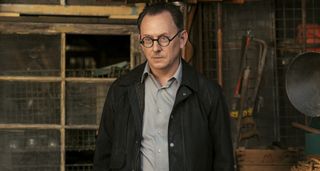
🚩🚩 NOTE: Big spoilers inbound! 🚩🚩
I was planning on making Amazon's Fallout TV show last at least a week, but by Sunday evening I'd devoured all eight episodes. My love of Fallout has been dwindling since Fallout 4's launch back in 2015, but the misadventures of Lucy, Maximus and the Ghoul have reignited my Fallout fervour. It's more than a great videogame adaptation; it's simply a great TV show.
But something's missing, and I don't just mean the supermutants—seriously, though, where are they at? I can't walk a yard in Fallout without bumping into them. Anyway! For all the dangers the trio face as they wander across the Wasteland—from stoned organ harvesters to hungry gulpers—their journey is absent a larger-than-life, scenery-chewing villain like Fallout's Master or Caesar from New Vegas.
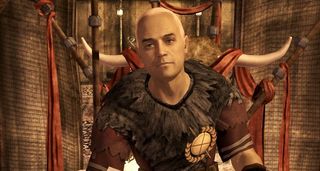
In the first episode, Moldaver is set up as Fallout's Big Bad. Her attack on Vault 33 and subsequent kidnapping of Hank is the impetus for Lucy's journey, but after that her presence is barely felt. She's mentioned a couple of times, and we learn a tiny bit about her background through the Ghoul's flashbacks, but she doesn't show up again until the final episode, where she gets to reveal the true nature of Vault-Tec before being killed off unceremoniously.
Granted, Moldaver's role is important when it comes to Lucy's transformation from sheltered Vault-dweller to determined Wastelander. Technically she's also now responsible for empowering everyone living on the surface, at least in what used to be LA, thanks to cold fusion—though I'd argue Lucy and Wilzig (RIP) deserve as much credit.
Regardless of importance, though, Moldaver isn't really the first season's antagonist. In RPG parlance, reaching her is simply Lucy's quest objective. For Maximus, meanwhile, she's the Brotherhood's competition. And for the Ghoul, she's a ghost from the past. She doesn't throw any obstacles in their way, or interfere at all, and then we discover that she's actually one of the good guys—as much as anyone in Fallout can be, anyway.
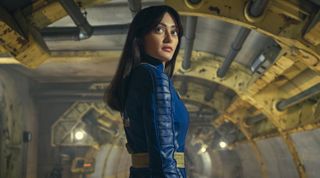
That leaves us with Vault-Tec. Obviously it's monumentally awful, and thanks to flashbacks we get to see just how shitty it was back before the bombs fell. This is probably one of the best parts of this adaptation: digging into Vault-Tec in a way none of the games have done before. We also finally have a pretty clear answer to a question Fallout fans have been asking for decades: who dropped the bombs? How things actually played out is still a bit of a mystery, but we know, thanks to Barb, that the apocalypse was planned by Vault-Tec.
The biggest gaming news, reviews and hardware deals
Keep up to date with the most important stories and the best deals, as picked by the PC Gamer team.
Vault-Tec, then, is more a mystery that the first season unravels rather than an adversary.
Just like Moldaver, however, the true nature of Vault-Tec isn't revealed until the finale, split into three parts: Norm's discovery in Vault 31, Moldaver's conversation with Lucy in the Griffith Observatory and the Ghoul's backstory. While Fallout vets will have already known the many almost comically terrible things Vault-Tec did in the Vaults, until the TV show players were given the impression that it had ceased to exist, and that impression was maintained right up until we realised what was happening in Vault 31.
With the cat out of the bag, it's all a great setup for the second season. Vault-Tec is responsible for everything, and is still ultimately running the show. But it took a whole season for this to become clear. We only ever get to see hints of the company's machinations, like the gulpers or the crater in what used to be Shady Sands, rather than what it's doing now. Vault-Tec, then, is more a mystery that the first season unravels rather than an adversary.
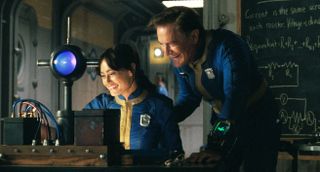
Vault-Tec, though, is not the only holdover from the old world. In the second episode, we're reintroduced to one of Fallout's most notorious antagonists: the villains of Fallout 2 and 3, the Enclave. After Wilzig escaped the fascistic former US shadow government's clutches, I assumed it would serve as the show's main threat. But that's the last we see of it. Nobody even explains what the Enclave's deal is. It's just tossed in there casually, and forgotten about immediately afterwards.
Anyone watching without the benefit of the games must have been a bit baffled. It's the only time we're shown anything outside of the Vaults that doesn't look post-apocalyptic. Even the Brotherhood base looks pretty war-torn. The Enclave base, meanwhile, is full of tech and scientists and automated turrets. Also, many well-behaved dogs—the surest indicator of civilisation.
I suspect creators Graham Wagner and Geneva Robertson-Dworet wanted to avoid overloading the audience, given that they've already got to get to grips with Vault-Tec, the Brotherhood and the remnant of the NCR. But it still feels like there's a hole where the Enclave should have been. There are a couple of scenes where Vault-Tec's strategy for the future is broken down simply: its greatest weapon is time. It waits out the nuclear apocalypse and rebuilds America from the ashes, conducting social experiments in its Vaults to gather data. But the games establish that this was all done on behalf of the Enclave and its plan to continue the war against communism even after the fall of the US. Given this, it's even more peculiar that the Enclave doesn't get more than a name drop.
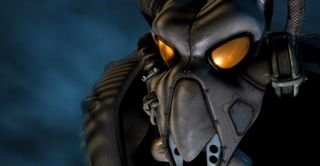
Unlike Vault-Tec, which was only revealed to have survived the Great War in the TV show, the Enclave has also been heavily involved in the post-apocalyptic era. While Vault-Tec executives hid in the Vaults, the Enclave had been busy enslaving survivors, developing new power armour, building armies and attempting to commit genocide. Luckily for most people in the Wasteland, the Enclave is generally too inept and arrogant to ever achieve its goals, which is why, by the time of Fallout: New Vegas, the organisation had pretty much been pushed out of the west, though as we now know, not entirely.
I can't think of a more perfect villain for the show, and nearly everything seems designed to set this up.
Since it's been active for centuries and is responsible for the discovery of cold fusion, it's so bizarre that it didn't make any visible effort to recapture Wilzig. If the Brotherhood was able to find him, why not his former masters? It would have made so much more sense for it to send out goons in power armour to retrieve him and, following his decapitation, hunt down Lucy. I can't think of a more perfect villain for the show, and nearly everything seems designed to set this up.
This might be another case of 'wait until season 2', but I'm not entirely convinced we'll see much of the Enclave even then. By establishing that Vault-Tec masterminded the apocalypse and didn't die out during the war, the Fallout TV show has effectively given the Enclave's role to its one-time partner. There's just not much room for the former shadow government anymore. Which is, admittedly, a weird thing to be disappointed by.
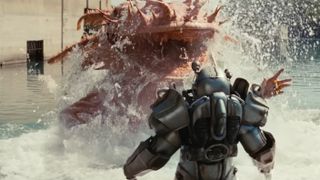
Despite this, Fallout manages pretty well without a clear antagonist for most of the show, but it does make this jaunt across the Wasteland feel easy-going compared to my own misadventures, and it diminishes the stakes.
After Lucy shakes the Ghoul and teams up with Maximus, their biggest obstacle is the accident-prone Thaddeus—a character who exists mostly for laughs, who spends an episode with only one functioning foot, and in the end he gladly gives them back Wilzig's stinky head. From there, they simply walk to their destination, with the Ghoul not far behind. It feels like there are some missing episodes and near-death experiences. Of course we know Lucy's going to find dear old Dad, but a few more moments that force us to consider 'what if she doesn't?' wouldn't have gone amiss.

Fraser is the UK online editor and has actually met The Internet in person. With over a decade of experience, he's been around the block a few times, serving as a freelancer, news editor and prolific reviewer. Strategy games have been a 30-year-long obsession, from tiny RTSs to sprawling political sims, and he never turns down the chance to rave about Total War or Crusader Kings. He's also been known to set up shop in the latest MMO and likes to wind down with an endlessly deep, systemic RPG. These days, when he's not editing, he can usually be found writing features that are 1,000 words too long or talking about his dog.
Most Popular




